Related Research Articles

The Pennines, also known as the Pennine Chain or Pennine Hills, are a range of uplands mainly located in Northern England. Commonly described as the "backbone of England" because of its length and position, the range runs from the north Midlands to North East England, near the Anglo-Scottish border. The Peak District is the southern end of the range, rising northwards from its foothills near the Trent Valley in northern Staffordshire, and further north into eastern Cheshire and southern Derbyshire. Beyond this are the South Pennines, Yorkshire Dales, and North Pennines, ending at the Tyne Gap. Beyond the gap are the Border Moors and Cheviot Hills, which are included in some definitions of the range.

Harrogate is a spa town in the district and county of North Yorkshire, England. Historically in the West Riding of Yorkshire, the town is a tourist destination and its visitor attractions include its spa waters and RHS Harlow Carr gardens. 13 miles (21 km) away from the town centre is the Yorkshire Dales National Park and the Nidderdale AONB.

Blubberhouses is a small village and civil parish in the Washburn Valley in North Yorkshire, England. The population as at the 2011 Census was less than 100, so details were included in the civil parish of Fewston. In 2015, North Yorkshire County Council estimated the population of the village and parish to be 40. Blubberhouses is situated to the south of the Yorkshire Dales National Park, and to the north of a Roman road and Fewston Reservoir on the A59 road linking Harrogate to Skipton.
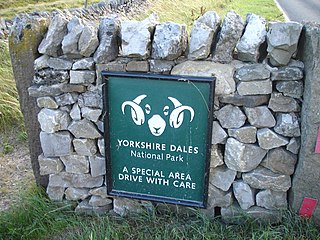
The Yorkshire Dales National Park is a 2,178 km2 (841 sq mi) national park in England covering most of the Yorkshire Dales, with the notable exception of Nidderdale. Most of the park is in North Yorkshire, with a sizeable area in Cumbria and a small part in Lancashire. The park was designated in 1954, and extended in 2016. Over 95% of the land in the Park is under private ownership; there are over 1,000 farms in this area.
Workers' Educational Associations (WEA) are not-for-profit bodies that deliver further education to adults in the UK, Australia, New Zealand, and Canada.

Pateley Bridge is a market town in Nidderdale in the county and district of North Yorkshire, England. Historically part of the West Riding of Yorkshire, it lies on the River Nidd. It is in the Yorkshire Dales and just outside the Yorkshire Dales National Park.
Greenhow is a village in North Yorkshire, England, often referred to as Greenhow Hill. The term how derives from the Old Norse word haugr meaning a hill and a mound, so Greenhow literally means 'Green's hill or mound'.
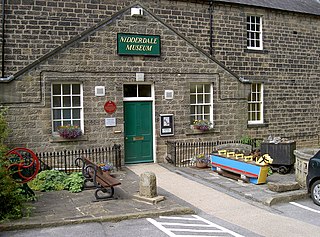
Nidderdale Museum is a local and social history museum in the market town of Pateley Bridge in Nidderdale, one of the Yorkshire Dales, in North Yorkshire, England. The museum is housed in a former workhouse, and is normally open every day from 1.30 p.m. to 4.30 p.m. from 1 April to 31 October, and on Saturdays and Sundays from 1.30 p.m. to 4.30 p.m. over the winter. There is a small entry charge for adults. Accompanied children are free.
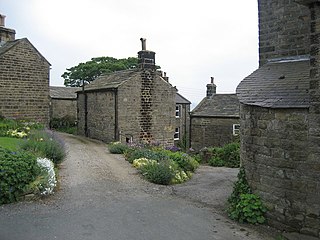
Middlesmoor is a small hill village at the head of Nidderdale in the Harrogate district of North Yorkshire, England. Middlesmoor is the principal settlement in the civil parish of Stonebeck Up, historically a township in the ancient parish of Kirkby Malzeard in the West Riding of Yorkshire.
Arthur Raistrick was a British geologist, archaeologist, academic, and writer. He was born in a working class home in Saltaire, Yorkshire. He was a scholar in many related, and some unrelated, fields. He published some 330 articles, books, pamphlets and scholarly treatises.

Bouthwaite is a hamlet in the Harrogate district of North Yorkshire, England. It is situated in Nidderdale, to the north of Pateley Bridge, close to the village of Ramsgill. The Nidderdale Way and Six Dales Trail both pass through the hamlet.

Sir Edward Baines, also known as Edward Baines Jr, was a nonconformist English newspaper editor and Member of Parliament (MP).

Scouting in Yorkshire and the Humber is largely represented by the Scout Association of the United Kingdom and some Groups of traditional Scouting including the Baden-Powell Scouts' Association.
Maurice Warwick Beresford, was an English economic historian and archaeologist specialising in the medieval period. He was Professor of Economic History at the University of Leeds.
John Fletcher Clews Harrison, usually cited as J. F. C. Harrison, was a British academic who was Professor of History at the University of Sussex and author of books on history, particularly relating to Victorian Britain.
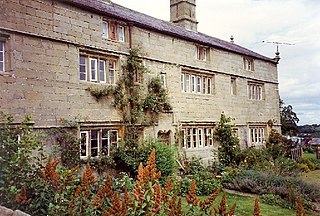
Hartwith cum Winsley is a civil parish in Harrogate district, North Yorkshire, England. Historically it was a township in the ancient parish of Kirkby Malzeard in the West Riding of Yorkshire, a detached part of that parish. It became a separate civil parish in 1866, and was transferred to North Yorkshire in 1974.

Heathfield is a hamlet in the civil parish of Stonebeck Down in upper Nidderdale, in North Yorkshire, England. It lies on a broad terrace on the west side of the dale, overlooking a steep slope down to the River Nidd.
Frances Jane Mansbridge was a British educationist who co-founded the Workers' Educational Association (WEA) with her husband, Albert Mansbridge (1876–1952).

Robert John Shaw is a British poet and pioneer of poetry and jazz fusion.
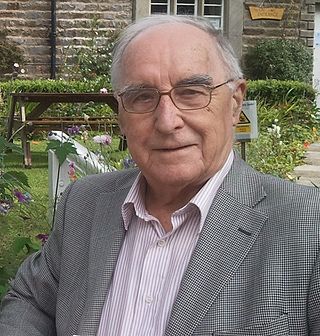
William Reginald Mitchell was a British writer who was the editor of Dalesman magazine for twenty years and over a sixty-year period wrote over 200 books, hundreds of articles, and delivered many talks on the history and physical and natural evolution of North Britain, with particular emphasis on the Yorkshire Dales, Lancashire and the Lake District. These include the regions' biographies, social history, topography, and natural history. In the course of his career Mitchell made and collected many taped interviews with people of these regions - now housed at the Universities of Leeds and Bradford - representing a unique archive of dialect and history.
References
- 1 2 3 Staite, Catherine (16 August 2017). "Bernard Jennings obituary". The Guardian. Retrieved 26 April 2019.
- ↑ Chaloner, W. H. (1969). "Reviews". The Economic History Review. 22 (1): 160. doi:10.2307/2591990. JSTOR 2591990.